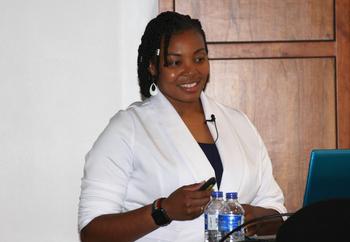
Traveling all the way from the University of California Merced, Biology alumna Carlisha Hall was the keynote speaker for the 2023 RISE End-of-Summer Research Symposium. Carlisha is an epidemiologist and PhD candidate in the School of Public Health at UC Merced. She earned a BS in Environmental Science in 2016 as a UNC Pembroke RISE Fellow and undergraduate researcher in Dr. John Roe’s lab, where she studied overwintering behaviors in box turtles.
Carlisha’s keynote address was entitled, “Oh, the Places You’ll Go!,” reminiscent of the popular Dr. Seuss children’s book. Her own journey began in her hometown of Winston-Salem, North Carolina. After earning a baccalaureate degree at UNCP, she completed post-baccalaureate research on attention-deficit and hyperactivity disorder (ADHD) at the National Institutes of Health in Bethesda, Maryland. Next up, she joined the AmeriCorps program, which placed her in Washington state with the US Fish and Wildlife Service and numerous hands-on experiences studying wildlife.
Carlisha’s journey has been a transitional one, across many states and from wildlife studies to human studies. After entering the Public Health Program at UC Merced in 2018, she began investigating the roles of environmental and demographic factors on physical and mental health. Even so, she maintains ties with wild animals by working in a nearby zoo. Carlisha has several publications to date, including work stemming from her undergraduate and post-baccalaureate research, as well as from her doctoral research. She cautioned the symposium’s largely undergraduate student audience to prepare to work hard in graduate school and to embrace new opportunities. With a solid education behind them, they will be going places!
The RISE symposium took place in the UC Annex on 25 August 2023. Dr. Ashley Allen, Associate Dean of the College of Arts and Sciences, welcomed the audience and described her early research experiences. Dr. Bob Poage, Co-Director of the RISE Program, introduced the symposium’s two speakers – undergraduate researcher Jacqueline Swann and alumna Carlisha Hall. Jacqueline and her faculty mentor, Dr. Courtney Alexander, examined the physiological effects of medicinal plant (elderflower) extracts on Parkinson’s disease. A poster session immediately followed the talks. More than two dozen students from across campus who did summer research, whether mentored on or off campus, presented research posters. Research on campus was funded by the RISE Program, the Office of Academic Affairs, and the Pembroke Undergraduate Research and Creativity (PURC) Program. The annual end-of-summer program was held historically in the Oxendine Science Building, but to accommodate increasing numbers of undergraduate researchers and their audience, the venue for the program was moved to the UC Annex in 2018.
The RISE (Research Initiative for Scientific Enhancement) Program is funded by the National Institute of General Medical Sciences of the National Institutes of Health. Its primary goal is to create a more diverse work force in scientific research by targeting undergraduate students from underrepresented groups.
For 16 years, RISE has guided UNCP students into graduate programs across the nation and has prepared them for careers in biomedical and biological research. RISE Cohort 16 includes students majoring in Biology, Chemistry, Environmental Science, and Physics. Carlisha Hall belonged to Cohorts 8-10. In addition to Co-Director Dr. Bob Poage (Biology), RISE leadership includes Program Director Dr. Rachel Smith (Chemistry) and Co-Director Sailaja Vallabha (Chemistry), both of whom are critical supporters of the annual symposium. Dr. Poage announced that the current RISE grant would terminate by the end of August but that RISE faculty were working hard to submit a new grant proposal by early next year, soliciting new funding to support future student research.